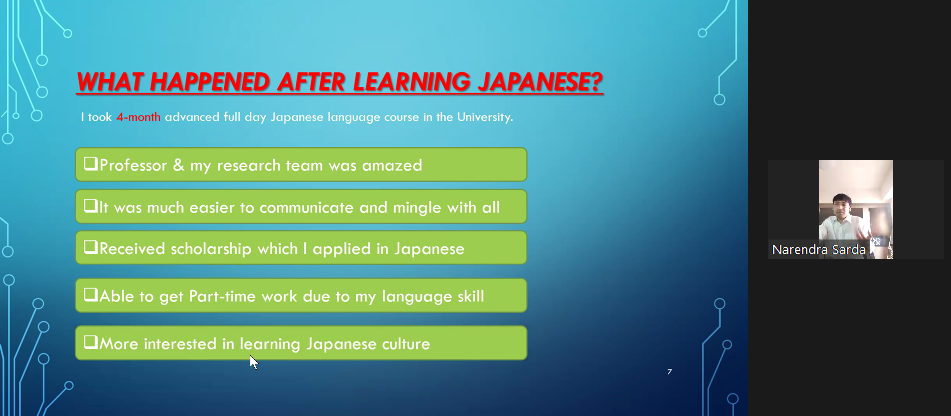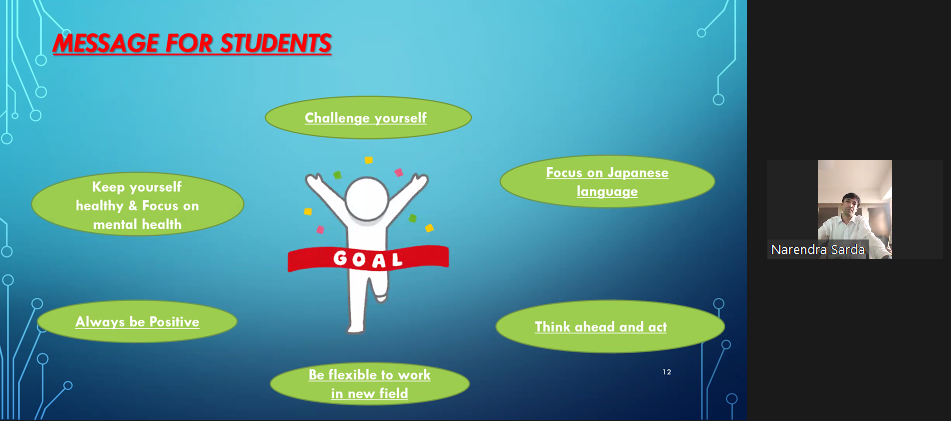(English follows Japanese.)
2022年9月22日、第143回コンソーシアム人材セミナー「高度外国人材の日本におけるキャリアパス拡大と日本語の習得(1回目)」をオンライン(Zoom Meeting)で開催しました。
【講 師】日立造船株式会社 ナレンドラ サルダ 氏
【参加者】23人
概要
本講演会では、博士研究と日本語能力を生かして日本で活躍する高度外国人材・ナレンドラサルダ氏(博士(学術))を講師にお迎えした。日本に滞在する高度外国人材にとって、日本語能力は、予測不能な時代において、研究能力を生かして活躍し続けるために欠かせないものであることが、実体験をもとに語られた。
インドの大学院で修士号を取得し助教として働いていた時期に日本への留学を志望。徳島大学大学院博士課程後期に入学し、博士(学術)学位を授与された。日本企業にR&Dエンジニアとして就職した後、専門分野でつちかった研究能力を発揮できるプロセスエンジニアに異動して、現在に至る。
入学当初は日本語がほとんど話せなかった。大学で手続きや研究をしようにも、誰かの助けが必要な状態。日本人とのコミュニケーションはスムーズにゆかず、正確な情報も得づらい毎日。半年後に一念発起し、指導教員に相談して、日本語学習に専念することにした。
平日は徳島大学で留学生向けの日本語学習コースを履修。余暇には動画サイトで日本語学習コンテンツや日本語のドラマを視聴。休日には家電量販店に出かけて販売員と対話するなど、実践的な会話練習にもチャレンジした。
こうした努力が実り、4か月で日本語能力試験(JLPT)N3レベルの語学力を習得。日本人との意思疎通がスムーズになり、研究は充実。懇親会での会話なども楽しめるようになった。
キャリアの選択肢も広がってゆく。日本企業への就職を志望し、「本物の仕事を知りたい」と考えて、「HIRAKU長期インターンシップ」(https://hiraku.hiroshima-u.ac.jp/younger_internship/)にチャレンジ。日本語による面接をクリアして採用された。インターンシップ期間中には日本語での実務に参加し、社員らと親睦。こうした経験を経て就職活動に取り組んだところ、大学院修了前に希望する企業からの内定を受けた。「日本語能力と長期インターンシップ経験がプラスに働いたのではないか」と考えている。
現在の勤務先では、昇進試験が日本語ベースで出題される。高い日本語能力があれば、昇進に有利に働く上に、永住権取得のポイントとしても加算される。帰国を希望する学生であっても、例えば、母国で日本企業に就職する道が開けるのではないか。
留学生や若い世代の外国人材には、ぜひ日本語を学習して欲しい。そのためにも、心身の健康は重要。どんな時にもポジティブに、新しいこと、苦手なことにも挑戦して欲しい。
-------------------
Seminar Report: Expansion of Career Paths for Highly Skilled Foreign Human Resources in Japan and their Acquisition of Japanese Language, #1/2
The 143rd Jin-Zai Seminar, "Expansion of Career Paths for Highly Skilled Foreign Human Resources in Japan and their Acquisition of Japanese Language (#1/2, Zoom Meeting)", was held online (Zoom Meeting) on September 22, 2022.
Speaker: Dr. Narendra Sarda
(Doctor of Philosophy (PhD), Hitachi Zosen Corporation)
Number of participants: 23
■Seminar Summary
This lecture featured Dr. Narendra Sarda, Ph.D., an advanced foreign human resource currently working in Japan, utilizing his Ph.D. research skills and Japanese language proficiency. Based on his experience, he spoke about how Japanese language skills are essential for advanced foreign human resources staying in Japan to keep active in society by demonstrating their research capabilities in this age of unpredictability.
He worked as an assistant professor after receiving his master's degree from a graduate school in India when he decided to study in Japan. He enrolled in the doctoral program at the University of Tokushima and was granted a PhD degree. After working as an R&D engineer for a Japanese company, he moved to a position as a process engineer, where he can utilize the research skills he has acquired in his field of expertise.
At the beginning of his enrollment, he hardly spoke Japanese. He needed someone's help whenever trying to complete his university procedures or conduct research. Communication with Japanese people did not go smoothly, and it wasn't easy to be informed quickly and accurately. After six months, he decided to devote himself to Japanese language study after consulting with his advisor and receiving permission.
On weekdays, he takes an intensive Japanese language course for international students at Tokushima University. In his spare time, he watched Japanese language learning content and dramas on video websites. On weekends and holidays, he went to town to practice and enjoy real conversation with Japanese people like salespeople at the electronics retail store.
These efforts were rewarded with acquiring JLPT (Japanese Language Proficiency Test) N3 level language skills in four months. His communication with Japanese people became smoother, and his research was greatly enhanced. Also, thanks to these efforts, he began enjoying communication at social gatherings.
His career options began to broaden. He was interested in working for a Japanese company, so he challenged the "HIRAKU Long-Term Internship Program" (https://hiraku.hiroshima-u.ac.jp/en/younger_internship/) to "get to know a real job". He passed the interview in Japanese and was selected for the internship. During the internship, he experienced practical work in Japanese and got acquainted with employees. After this experience, he engaged in job hunting and received a job offer from the company of his choice before completing his dissertation. He believes that his Japanese language skills and long-term internship experience were beneficial.
At his current workplace, the promotion examination is Japanese-based. A high level of Japanese language ability will not only be advantageous for promotion but will also count as points for acquiring Permanent Resident status. Even for students who wish to return to their homelands, proving their Japanese language proficiency may pave the way for them to find jobs at Japanese companies in their homelands.
He encouraged the younger generation of non-Japanese human resources to learn the Japanese language. Physical and mental health is also essential for this purpose. He hopes they will always be positive and challenge anything new or challenging.


【お問い合わせ先 / Contact Information】
広島大学グローバルキャリアデザインセンター(担当 田中) / Global Career Design Center, Hiroshima University (TANAKA)
E-mail:wakateyousei(AT)office.hiroshima-u.ac.jp
*(AT)は半角の@に変換してください。 / Please replace (AT) with @.
TEL:082-424-4564

 Home
Home
